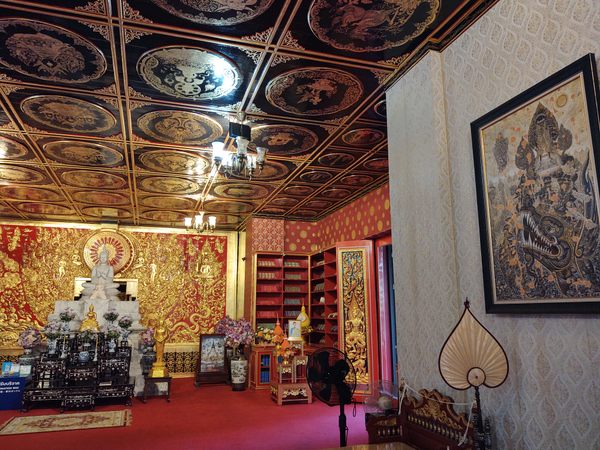The metropolitan area of Bangkok is estimated to be home to at least 400 Buddhist temples (wats), with only about 100 of them no longer operational. The most common sect of Buddhism in Thailand is Theravāda, which places a great value on its monastic orders. As such, most temples in Bangkok will actually home and educate monks, depending on donations for their food, clothing, and other needs. Since a large percentage of the male population will think of becoming a monk as a temporary option rather than a lifetime vocation, wats have to be able to respond to demographic changes easily, which in turn means flexibility with their funding.
Therefore, temples can be somewhat competitive with each other, not only on devotional terms but even financially (this is not exclusive to Buddhism, as the trend is well-known among some Christian churches and other religious spaces). It is not rare for Thai wats to try and stand out from one another—Sutthi Wararam is an example of this.
Art is common in practically all temples, and many use traditional murals and sculptures celebrating the life of Siddhartha Gautama and other figures, showcasing the cosmogony of Buddhist life and afterlife, or creating atmospheres conducive to meditation and prayer.
Wat Sutthiwararam (as it’s also known) opts for displays of nontraditional artworks. A majority of these follow modern art trends, like minimalism and abstraction. They still align with religious themes, which results in interesting illustrations of mythical garudas, the cycle of reincarnation, nirvana, avatars of Buddha, and many other concepts and beliefs. Traditionalism is not eschewed entirely, as most of the artwork is also sculptural or graphic (although framed images do seem to take precedence over murals).
With the abundance of wats in a city like Bangkok, Sutthi Wararam’s artwork choices certainly make it stand out. In turn, doing things a little differently might mean that they get better patronage to support their monks and other services. For those who visit the temple, its combination of religion with a modern art gallery feeling makes it a unique find.

